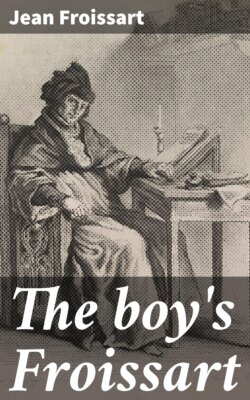Читать книгу The boy's Froissart - Froissart Jean - Страница 14
На сайте Литреса книга снята с продажи.
CHAPTER X.
Robert Bruce, King of Scotland, defies King Edward.
ОглавлениеTable of Contents
AFTER the departure of Sir John de Hainault, King Edward and his mother governed the kingdom by the counsels of the good Earl of Kent and of Sir Roger Mortimer. Both of them had been banished with the queen. They also took the advice of Sir Thomas Wager, and of others who were esteemed the wisest in the land. This, however, created much envy, which never dies in England, but reigns there as well as in other places. Thus passed the winter and Lent in perfect peace until Easter; when it happened that Robert, King of Scotland, who, though brave, had suffered much in his wars with England, having often been defeated by King Edward, grandfather of the young king, being at this time very old and afflicted with leprosy, hearing that the king had been taken prisoner and deposed, and his counsellors put to death, thought it a favorable opportunity to send a defiance to the present king, as yet a youth, whose barons were not on good terms with each other, and to attempt the conquest of some part of England. About Easter, 1327, he sent a defiance to King Edward and all the country, informing them that he would enter the kingdom, and burn it as far as he had done before after the defeat of Stirling, in which the English suffered so much.
When the young king and his council received this challenge, they published it throughout the kingdom, and ordered that all the nobles and others should come properly accoutred and accompanied, according to their different ranks, to York, the Day of Ascension following. He also sent a considerable body of men at arms to guard the frontiers of Scotland, and messengers to Sir John de Hainault, begging him very affectionately to assist and accompany him in this expedition, and to meet him at York on Ascension Day with as many companions in arms as he could bring with him.
Sir John and his company reached York by the appointed time, and were welcomed and magnificently entertained by the king, queen, and all the barons. The handsomest suburbs of the city were assigned them for their quarters, and a monastery of white friars was allotted for him and his household. In company with the knight came from Hainault the Lord of Anghien (called Sir Walter), Sir Henry, Lord of Antoing, the Lord of Seignoles, and the following knights,—Sir Fastres de Reu, Sir Robert de Bailleul, Sir William de Bailleul his brother, the Lord of Havereth (castellan of Mons), Sir Alart de Briseil, Sir Michael de Ligne, Sir John de Montigny the younger, and his brother Sir Sause de Boussac, Sir Percival de Severies, the Lords of Gommegines, De Biaurien, and De Folion. There came also from Flanders, first, Sir Hector de Vilains, Sir John de Rhodes, Sir Vaufflat de Guistelle, Sir James de Guistelle his brother, Sir Gossuin de la Muelle, and the Lord of Tarces. Many came from Brabant; as the Lord of Dusle, Sir Thierry de Vaucourt, Sir Rasses de Gres, Sir John de Cassebegne, Sir John Pilestre, Sir William de Courterelles, the three brothers De Harlebeque, Sir Walter de Hautebergue, and several others. Of the Bohemians were, Sir John de Libeaux, Henry his brother, Sir Henry de la Chappelle, Sir Hugh de Hay, Sir John de Limies, Sir Lambert des Prez, Sir Gilbert de Hers. There came also other volunteer knights out of Cambresis and Artois, in hopes of advancement; so that Sir John had five hundred good men in his company, well apparelled and richly mounted.
